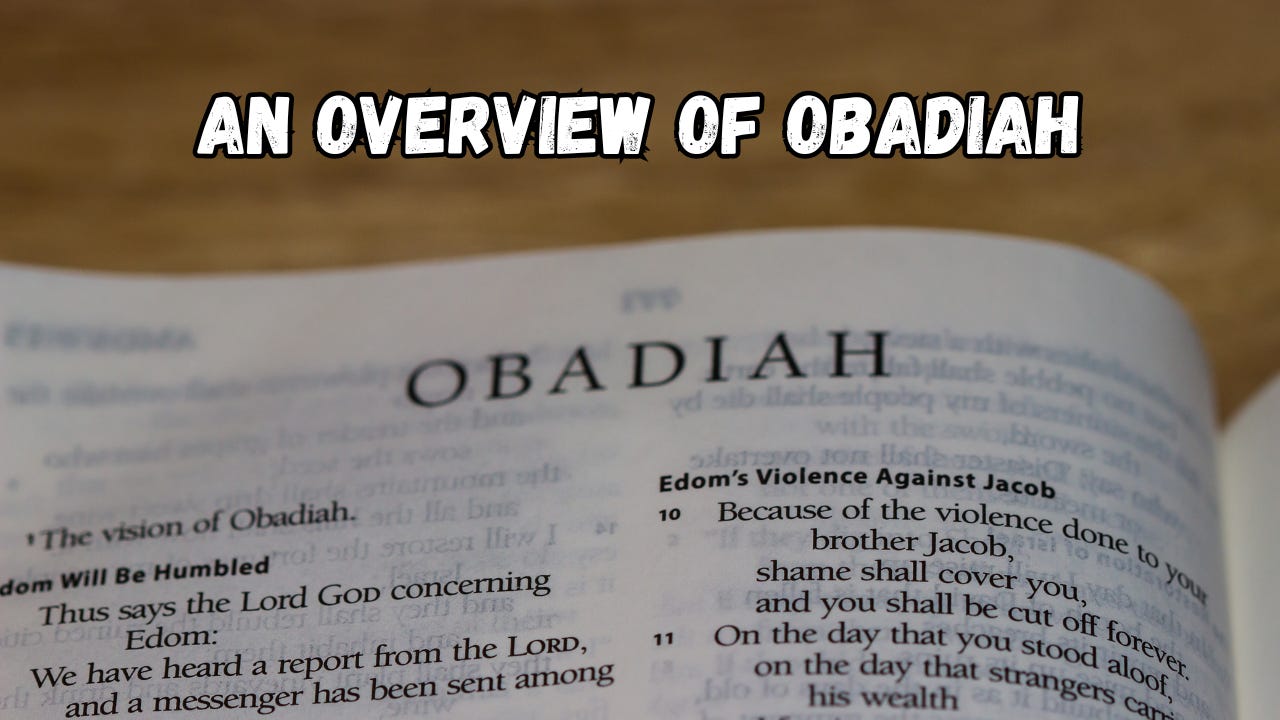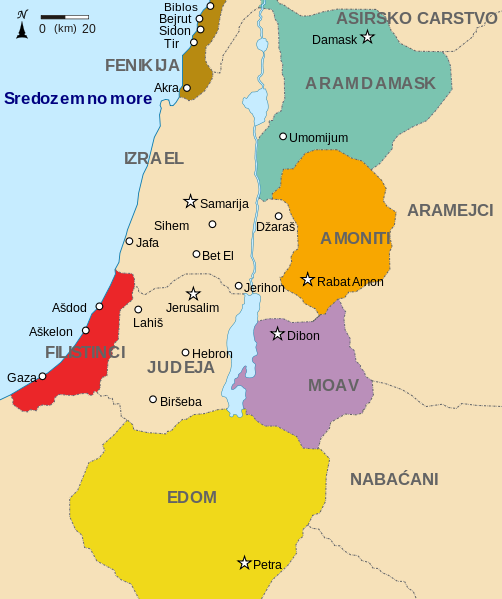The small book of Obadiah is rather interesting in that it’s directed at a nation other than Israel or Judah.
While it’s one of the shortest books in the Bible, it still holds powerful lessons for us today.
An Outline of Obadiah.
The Lord will bring Edom down (1:1-9).
This will happen because of how Edom treated his brother Jacob/Israel (1:10-14).
While Edom will be humbled, Israel will be exalted in the Day of the Lord (1:15-21).
The History of Edom.
Since this book is about what would happen to the nation of Edom, it’s good to refresh our memory about the Edomites.
The nation of Edom occupied the mountains southeast of Israel. Mountains and desert surrounded them. Edom became wealthy thanks to mining operations for copper on their land.
The Edomites were the descendants of Esau. At first, Jacob and Esau had conflict, but they eventually reconciled (Genesis 25-33). However, conflict resumed between their descendants after the nation of Israel left Egypt, and Edom refused to allow Israel to travel through their land on the way to Canaan (Numbers 20:14-21).
Conflict continued between the two nations until David subdued Edom (2 Samuel 8:14). Sometime later, during the days of the Divided Kingdom, Edom revolted against King Joram of Judah and maintained their freedom (2 Kings 8:20-22).
Edom joined with the Babylonian forces in the siege of and fall of Judah in 586 B.C. They were one of the nations to fill the power vacuum left when Judah was carried into captivity.
The Edomites were eventually driven from their land by foreign nations. By the time Malachi was written, Edom had suffered a tremendous defeat (Malachi 1:2-4).
Finally, they were conquered by John Hyrcanus of the Maccabees near the end of the second century B.C. and forced to be circumcised and follow the Law. As a people, they are lost to history by A.D. 100.
God refers to the character of Esau as being a “fornicator” and “wicked” (Hebrews 12:16). Edom maintained hatred and bitterness for Israel (Amos 1:11). In the prophets, Edom often stands as a symbol of earthly, non-spiritual people.
Five Lessons from Obadiah.
1) Pride is deceptive and will ultimately bring destruction (1:3).
The pride of your heart has deceived you, You who dwell in the clefts of the rock, Whose habitation is high; You who say in your heart, 'Who will bring me down to the ground?'
Edom placed their trust in their mountain strongholds and had a false sense of security. Their “trusty” mountain fortresses ultimately did not save them.
In their pride, they had divided the spoil of Israel between themselves – and their pride would be their downfall (Proverbs 16:18-19).
2) No one can escape the judgment of God (1:4-9).
Though you ascend as high as the eagle, And though you set your nest among the stars, From there I will bring you down," says the LORD. "If thieves had come to you, If robbers by night—Oh, how you will be cut off!—Would they not have stolen till they had enough? If grape-gatherers had come to you, Would they not have left some gleanings? "Oh, how Esau shall be searched out! How his hidden treasures shall be sought after! All the men in your confederacy Shall force you to the border; The men at peace with you Shall deceive you and prevail against you. Those who eat your bread shall lay a trap for you. No one is aware of it. "Will I not in that day," says the LORD, "Even destroy the wise men from Edom, And understanding from the mountains of Esau? Then your mighty men, O Teman, shall be dismayed, To the end that everyone from the mountains of Esau May be cut off by slaughter.
Edom could not climb high enough to escape from God - their destruction would be complete.
Most thieves won’t take everything – only what they want or can carry. But Edom would be thoroughly cleaned out when their enemies turned on them. Their supposed “allies” would betray and attack them.
3) Do not rejoice at your brother’s downfall (1:10-14).
For violence against your brother Jacob, Shame shall cover you, And you shall be cut off forever. In the day that you stood on the other side—In the day that strangers carried captive his forces, When foreigners entered his gates And cast lots for Jerusalem—Even you were as one of them. "But you should not have gazed on the day of your brother In the day of his captivity; Nor should you have rejoiced over the children of Judah In the day of their destruction; Nor should you have spoken proudly In the day of distress. You should not have entered the gate of My people In the day of their calamity. Indeed, you should not have gazed on their affliction In the day of their calamity, Nor laid hands on their substance In the day of their calamity. You should not have stood at the crossroads To cut off those among them who escaped; Nor should you have delivered up those among them who remained In the day of distress.
The book of Obadiah is a rebuke to those who receive some sense of satisfaction in the misfortunes of another.
Edom rejoiced in and was actively involved in his brother’s downfall – and as a result, God would see to Edom’s downfall.
4) “What goes around, comes around” (1:15-16).
For the day of the LORD upon all the nations is near; As you have done, it shall be done to you; Your reprisal shall return upon your own head. For as you drank on My holy mountain, So shall all the nations drink continually; Yes, they shall drink, and swallow, And they shall be as though they had never been.
“God is not mocked, whatever a man sows, that he will also reap” (Galatians 6:7). Edom had sown destruction, and they would reap the same.
Edom’s destruction would be more complete and thorough than even Judah’s had been.
5) God provides a way of deliverance (1:17, 21).
But on Mount Zion there shall be deliverance, And there shall be holiness; The house of Jacob shall possess their possessions…Then saviors shall come to Mount Zion To judge the mountains of Esau, And the kingdom shall be the LORD's.
God spoke of Israel returning from captivity, while Edom would have no such return.
However, God also speaks of something greater – there will be hope for everyone, including Edom, when the Messiah comes. The gospel would go out “to the end of the earth” (Acts 1:8).
Obadiah reminds us of the dangers of pride – and how our pride will surely be our downfall. Obadiah also reminds us that there is a price for mistreating others.
Thankfully, Obadiah also reminds us that there is hope for everyone who will turn to the Savior.







This was an awesome lesson; thank you.